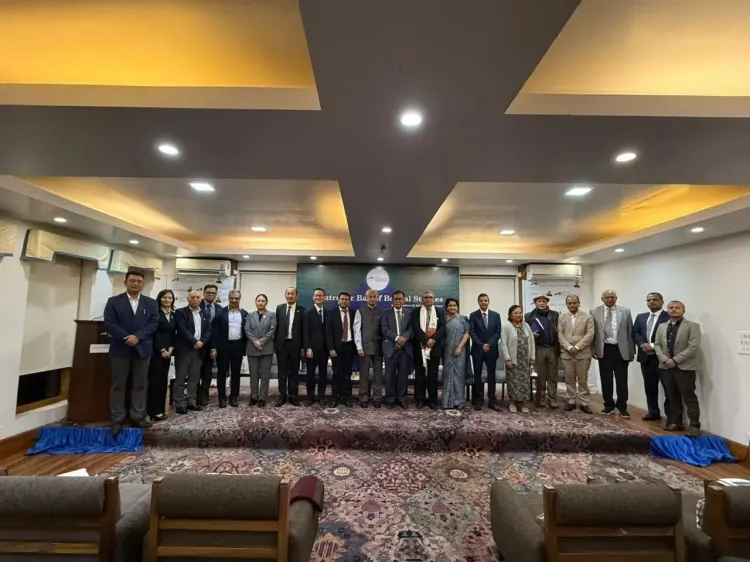What is the newly launched 'Centre for Bay of Bengal Studies' in Shillong aiming for?

Synopsis
Key Takeaways
- The Centre aims to enhance regional cooperation among Bay of Bengal nations.
- It focuses on trade, connectivity, and sustainable development.
- Key figures from BIMSTEC participated in the launch.
- It promotes academic and policy exchanges.
- Efforts are being made to improve physical and economic connectivity.
Shillong, Oct 31 (NationPress) A new Centre for Bay of Bengal Studies was inaugurated in Shillong on Friday to enhance research, policy dialogue, and regional collaboration among the nations and states linked by the Bay of Bengal. This initiative is designed to promote cooperation in areas such as trade, connectivity, and sustainable development throughout South and Southeast Asia.
The centre aims to act as a platform for fostering academic and policy exchanges, facilitating what experts refer to as "third space" cooperation among regional stakeholders.
During a high-level panel discussion titled "Himalayas to the Bay of Bengal: Envisioning a Resilient and Prosperous Future – Opportunities and Challenges", Ambassador Indra Mani Pandey, Secretary-General of the Bay of Bengal Initiative for Multi-Sectoral Technical and Economic Cooperation (BIMSTEC), emphasized the significant role the Centre for Bay of Bengal Studies will play in enhancing regional engagement.
Ambassador Pandey noted that the initiative is timely, aligning with the increasing necessity for deeper collaboration in light of evolving global and regional challenges.
C.S.R. Ram, Joint Secretary (BIMSTEC and SAARC) in the Ministry of External Affairs, highlighted India’s commitment to regional cooperation through various initiatives including the Neighbourhood First, Act East Policy, and MAHASAGAR (Mutual and Holistic Advancement for Security and Growth Across Regions) frameworks.
Former North Eastern Council (NEC) member M.P. Bezbaruah and former Minister of State for External Affairs and Education Dr. Rajkumar Ranjan Singh underscored the necessity of improving physical and economic connectivity between India and Southeast Asia to unlock the Bay region's potential.
Prithvish Nag, former Surveyor General of India, in his presentation, traced the Bay of Bengal's historical significance as a hub of maritime trade and cultural exchange, urging renewed efforts to restore its economic and strategic vitality.
The inaugural discussion featured senior diplomats and policy representatives from BIMSTEC member nations, including Abe Noraike, Minister and Counsellor (Political), Embassy of Japan in India; Preeti Rahman, Deputy High Commissioner of Bangladesh in India; Ambika Prasad Joshi, Counsellor (Minister), Embassy of Nepal in India; and Tshewang Dorji, Director (Bhutan), BIMSTEC.
The speakers emphasized that the Bay of Bengal region is positioned at the intersection of South and Southeast Asia and is crucial to India’s strategic outreach under the Neighbourhood First and BIMSTEC frameworks. They called for practical, commercially viable, and mutually beneficial partnerships to drive economic and social growth.
The establishment of the Centre is expected to enhance regional understanding and policy cooperation through research-based initiatives and sustained dialogue among governments, think tanks, academia, and businesses across the Bay of Bengal region, according to a statement.









